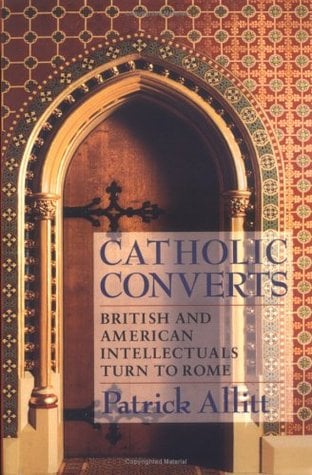The modern age has known many false prophets who have challenged the moral and spiritual beliefs of the Christian faith. Although churchmen have not always been vigilant in defense of traditional religion, one institution able to resist the secularizing trends of the 19th and 20th century has been the Catholic Church. But it has not done so, as Patrick Allitt suggests, because of an overabundance of intellectual creativity at its disposal. Indeed, the Church was slow to approve new developments in the natural and social sciences, historical research, and biblical exegesis for fear these new ideas might undermine religious faith. Yet, despite her resistance to innovation, from 1800 to 1960 the Roman Catholic Church in England and America attracted many gifted scholars and writers from diverse backgrounds who contributed enormously to the intellectual life of the Church and to the wider culture. Allitt, an Episcopalian who teaches history at Emory University, argues that these men and women dominated Catholic intellectual life and that their contributions to culture remain worthy of study.
These converts, as Allitt shows, became Catholics in the belief that the Church preached spiritual truths often denied by other religious communions. Being Christians already, they were choosing the religious denomination most faithful to the Gospel as they understood it; many, observing the threats to religious orthodoxy posed by secular liberalism, concluded that the Catholic Church possessed the means to resist these challenges, while other religious bodies did not.
Given the preference for neo-scholasticism among Catholic prelates, converts who were not attracted to this philosophical school contributed to other areas of study: literature, history, and the social sciences especially. A number of British converts—including G.K. Chesterton, Hugh Benson, and Ronald Knox—”tried to dazzle their readers with wit, erudition, and ostentatious orthodoxy.” Their approach, as Allitt points out, was to criticize the premises of non-Catholic philosophy and science, to show its epistemological weaknesses, and to reveal its ties to a callow idealization of progress. They also used their Catholic insights to enlighten contemporary political debates, making the case that, without the guidance of faith, social chaos would engulf the world. World War I gave their critique of progress new credibility in the eves of a skeptical public weary of Catholic claims. As Orestes Brownson took up the cause against the cult of progress in America in the 19th century, so other converts have done in the 20th. For many of them, “progress” meant the rise of materialism, militant nationalism, and total war, and they feared that by turning away from Christ and the Church He founded, humanity was on the path of self-destruction.
Living through World War II and the advent of the Cold War, many converts began to question whether the moral decay of Western society could ever be halted. Cradle Catholics saw the rise of communism and uniformly opposed it; so did the converts. Arnold Lunn, prominent Olympic gold medalist and author, wrote political commentary for National Review while Christopher Hollis (like Hugh Benson and Ronald Knox, an Anglican bishop’s son) became a staunch Conservative member of Parliament. But they, and others, questioned whether any means could prevent the deterioration of religion and morality. “We Catholics may be unable to arrest the world’s progress to self-destruction,” Arnold Lunn wrote to Ronald Knox in 1949, “but at least we understand what is destroying us. We have at least the melancholy satisfaction of not being simultaneously bewildered and annihilated.”
Most of these writers were critical of scientism, the application of Darwinism to history, philosophy, and the social sciences in particular. They attacked Darwinism’s extreme claims while defending what could be salvaged from its general theory in the understanding that science and Christianity are allies, not enemies. They frequently voiced opposition to eugenics, the Hitlerian byproduct of evolutionary theory, and they uniformly condemned Marx and his intellectual offspring. Here Allitt offers a reserved acknowledgment that, despite being seen as unfashionably narrow minded and reactionary by their critics, these articulate defenders of Catholicism turned out to have understood Marxism correctly.
Relying heavily on secondary sources, Allitt is sometimes taken in by liberal Catholic historians with an ax to grind. Knowing that a scholar’s contribution may be worthy of attention whether or not his work is recognized by his contemporaries, Allitt has discovered forgotten Catholic converts to make his case. Yet he neglects neo-scholastic cradle Catholic philosophers and theologians whose intellectual achievements were equal to those of their better-known convert colleagues. John Courtney Murray and his intellectual nemesis, Msgr. Joseph Fenton of the American Ecclesiastical Review, were cradle Catholics, as were Anton Pegis and Vernon Bourke.
Is it fair to imply, as Allitt does, that Walter Ong, S.J., would not have become a gifted and well-respected scholar had he never studied under Marshall McLuhan, a convert? If an oppressive papacy is the cause of the Church’s intellectual backwardness, why so many gifted French cradle Catholic writers such as Etienne Gilson, Paul Claudel, Leon Bloy, Charles Peguy, and George Bernanos? What are we to make of scholastic philosopher Yves Simon, who attended French Catholic universities in the I930’s, then fled the Nazi occupation to teach in South Bend at the University of Notre Dame?
Despite its failings. Catholic Converts is the best survey of English and American Catholic converts in print. It is reasonable to argue that, by comparison with cradle Catholics, converts in England and America, especially in the last century, did have a greater influence among the laity and a wider hearing from the non-Catholic world. These converts engaged a culture hostile to morality and religion, in circumstances not dissimilar to our own. We would do well to learn from the successes and failures of these veterans of the early culture wars.
[Catholic Converts: British and American Intellectuals Turn to Rome, by Patrick Allitt (Ithaca: Cornell University Press) 343 pp., $35.00]

Leave a Reply